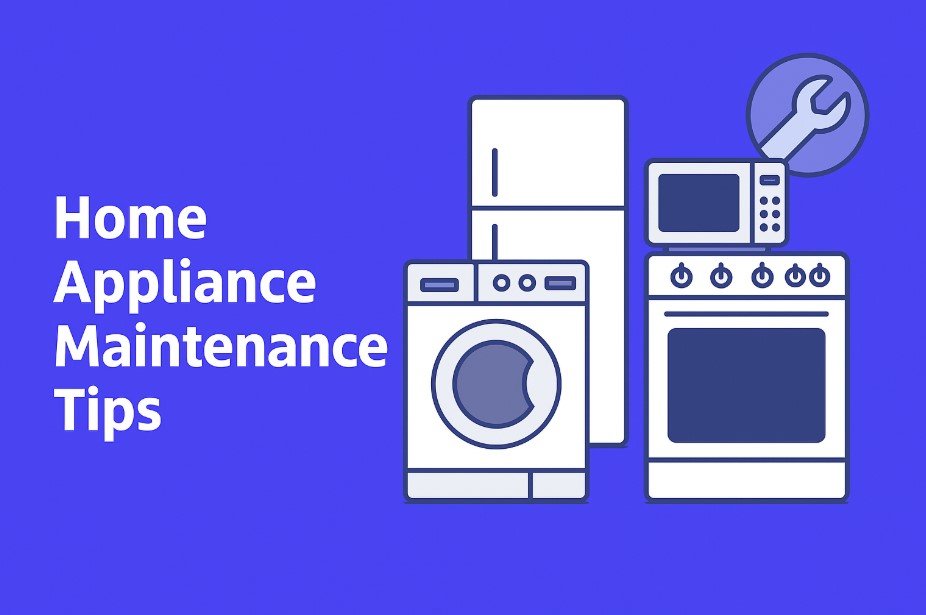Home Improvement
Essential Home Appliance Maintenance Tips for Longevity and Efficiency

Well-maintained home appliances operate at peak efficiency, deliver consistent results, and last years longer than neglected units. Integrating simple care habits into your household routine can save money on energy consumption, limit costly repairs, and reduce the inconvenience of breakdowns. An often-overlooked strategy to support appliance longevity is sourcing reliable components, such as Samsung Parts, which help ensure repairs restore devices to optimal function.
Regular maintenance doesn’t need to be difficult or time-consuming. Sticking to a routine and promptly addressing minor issues ensures that key appliances—such as refrigerators, washers, and ovens—run efficiently for years. This guide outlines essential tips for keeping your most important home appliances in top condition.
Refrigerator Maintenance
Ensuring your refrigerator operates efficiently is crucial for both food safety and energy conservation. Every six months, clean the condenser coils—these tend to gather dust and pet hair, restricting airflow and forcing your fridge to work harder. Use a vacuum or coil brush, and unplug the unit first for safety. Door seals are another vulnerability; damaged seals can cause cool air leaks and increase energy use, so check them monthly and replace them if needed. Make it a habit to confirm that the internal temperature stays between 35°F and 38°F for optimal food preservation and efficiency.
Washing Machine Care
Your washing machine works hard every week, so a little routine care goes a long way. Use only high-efficiency detergent to minimize buildup inside the drum and dispenser. Once a month, run an empty load with hot water and a cup of white vinegar or a specialized cleaner to eliminate soap scum and mildew. Please don’t overlook the hoses: check them for cracks or leaks every few months, and replace them at least every five years to avoid water damage from unexpected bursts.
Dishwasher Upkeep
The filter in your dishwasher collects food debris and must be cleaned regularly—ideally every two weeks—to prevent blockages and smelly buildup. The spray arms should also be inspected to ensure small holes are clear and not clogged with mineral deposits. Use the right amount and type of dishwasher detergent to avoid residue both in the machine and on your dishes. Consumer Reports emphasizes the importance of regular cleaning and filter maintenance to ensure modern dishwashers operate at their optimal performance. Regularly running a dishwasher cleaning cycle with a specialized cleaner can help remove hidden buildup and keep odors at bay. Taking a few extra minutes to wipe down the door seals and edges also ensures your appliance stays fresh and efficient.
Oven and Stove Maintenance
For ovens and stovetops, quick cleaning after spills prevents baked-on messes that can cause smoke or affect performance. If your range or cooktop uses burners or igniters, ensure they’re debris-free and not blocked, which helps with both safety and efficiency. When you notice uneven baking, check the oven’s temperature with an oven-safe thermometer and recalibrate if necessary to avoid under- or over-cooking food.
Microwave Maintenance
Clean the interior of your microwave promptly after spills using a mild detergent or steam (heat a bowl of water for a few minutes) to loosen stuck food. Periodically inspect the door and seal to ensure they close tightly—this is especially important for both energy conservation and safety. Also, keep vents unobstructed to prevent overheating and reduce efficiency.
Dryer Maintenance
After every use, remove lint from the trap. Blocked lint traps can significantly increase the risk of fire and reduce the effectiveness of drying. Once a year, disconnect the vent hose and remove any accumulated lint from the ductwork. Inspect the drum seal for wear and replace it as needed; a good seal prevents energy waste and keeps clothes from catching inside the drum.
Air Conditioner Maintenance
Replace or clean filters at least once a month during peak seasons to maintain healthy airflow and quality. Dirty filters make AC units work harder, increasing wear and utility bills. Ensure the thermostat works accurately and is set to an energy-efficient temperature. Keep the outdoor condenser unit clear of leaves and debris and rinse the coils for best cooling efficiency—simple steps that can help you avoid expensive repairs.
Water Heater Maintenance
Once a year, flush your water heater tank to remove sediment that can reduce efficiency or block proper heating. Check the anode rod every few years; this part helps prevent rust inside your tank and should be replaced if it’s heavily corroded. Consider wrapping your water heater with an insulating blanket (unless your unit specifically prohibits it) to reduce standby heat loss and lower energy costs, as recommended by the U.S. Department of Energy. Regular maintenance like this not only extends the life of your water heater but also ensures it operates safely and efficiently. Keeping a simple maintenance schedule can save both energy and costly repairs over time.
Conclusion
Adopting these essential maintenance strategies empowers you to keep your home’s appliances in top condition. Not only does this foster greater energy savings and fewer repair bills, but it also supports more sustainable energy use and a safer household environment. Stay proactive and refer to authentic parts suppliers for any replacement needs to make your maintenance efforts even more effective.
-

 Entertainment1 month ago
Entertainment1 month ago123Movies Alternatives: 13 Best Streaming Sites in 2026
-

 Entertainment2 months ago
Entertainment2 months ago13 Free FMovies Alternatives to Watch Movies Online in 2026
-

 Entertainment1 month ago
Entertainment1 month ago13 Flixtor Alternatives to Stream Free Movies [2026]
-

 Entertainment1 month ago
Entertainment1 month agoGoMovies is Down? Here are the 11 Best Alternatives






